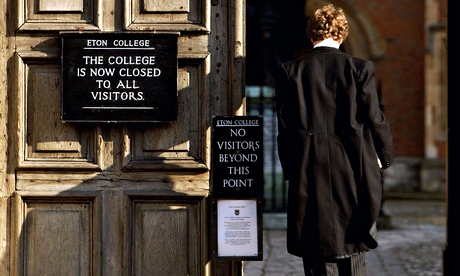Elitism so embedded in Britain that it could be called social engineering, social mobility commission concludes

Eton College. Photograph: Graeme Robertson/Getty Images
Britain is "deeply elitist" because people educated at public school and Oxbridge have in effect created a "closed shop at the top", according to a government report published on Thursday.
The Social Mobility and Child Poverty Commission said its study of the social background of those "running Britain" was the most detailed of its kind ever undertaken and showed that elitism was so embedded in Britain "that it could be called 'social engineering'".
Alan Milburn, the Labour former cabinet minister who chairs the commission, said that, as well as being unfair, this situation was unacceptable because "locking out a diversity of talents and experiences makes Britain's leading institutions less informed, less representative and, ultimately, less credible than they should be".
The commission's 76-page report mostly focuses on analysis, but it does include recommendations, saying government, schools, universities, employers and even parents all need to play their part in promoting social diversity.
Looking at the background of more than 4,000 people filling jobs at the top of government, the civil service, the judiciary, the media, business and the creative industries, the commission investigated where they went to school, on the grounds that going to a private school is reasonably indicative of a wealthy background.
Only 7% of members of the public attended a private school. But 71% of senior judges, 62% of senior officers in the armed forces, 55% of permanent secretaries in Whitehall, 53% of senior diplomats, 50% of members of the House of Lords and 45% of public body chairs did so.
So too did 44% of people on the Sunday Times Rich List, 43% of newspaper columnists, 36% of cabinet ministers, 33% of MPs, 26% of BBC executives and 22% of shadow cabinet ministers.
Oxbridge graduates also have a stranglehold on top jobs. They comprise less than 1% of the public as a whole, but 75% of senior judges, 59% of cabinet ministers, 57% of permanent secretaries, 50% of diplomats, 47% of newspaper columnists, 44% of public body chairs, 38% of members of the House of Lords, 33% of BBC executives, 33% of shadow cabinet ministers, 24% of MPs and 12% of those on the Sunday Times Rich List.
The report says the judiciary is the most privileged professional group. About 14% of judges attended one of just five independent schools (Eton, Westminster, Radley, Charterhouse and St Paul's Boys).
And senior armed forces officers are the second most exclusive group, the report says. Some 62% of them went to a private school, and only 7% attended a comprehensive.
Milburn said that having such little diversity at the top of society was "not a recipe for a healthy democratic society".
He explained: "Where institutions rely on too narrow a range of people from too narrow a range of backgrounds with too narrow a range of experiences, they risk behaving in ways and focusing on issues that are of salience only to a minority but not the majority in society."
Tristram Hunt, the shadow education secretary, said the report showed the coalition was failing on social mobility. "Under the Tories, the attainment gap between disadvantaged children and the rest is increasing, millions of hardworking people are seeing their living standards go backwards and child poverty is set to increase," he said.
No comments:
Post a Comment